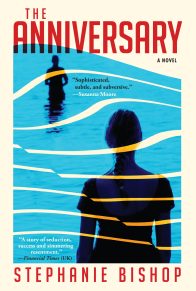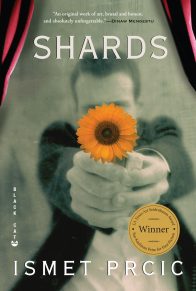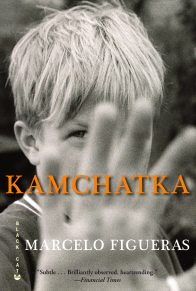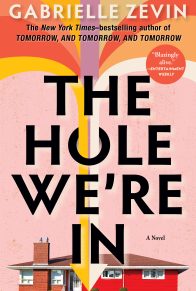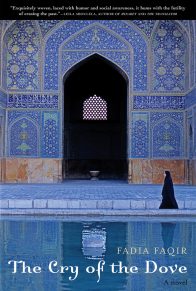“Spellbinding . . . There is something of Marguerite Duras in these pages, something of the lust between the young Western girl and the Asian man that drove novels like The Lover and The North China Lover. But while Duras focuses mostly on desire, Echlin focuses on absolute love—physical desire coupled with the need to know everything about the beloved, to follow him even to the grave and beyond. . . . Echlin captures the beauty and horror of Cambodia in equal measure . . . [and] love and death pulsate through [her] pages, interlaced. . . . Exquisite . . . [Echlin] creates alchemy. She permits what has been unsaid to be said, and what has been nameless to be named at last.” —Dalia Sofer, The New York Times Book Review
“Astonishing . . . The sheer beauty of Echlin’s writing—as lyrical as it is honest—keeps us reading through the pain.” —Anna Mundow, The Boston Globe
“[A] poignant love story . . . Lush and poetic . . . The Disappeared is a passionate and emotionally wrenching novel that forces us to remember and provides witness to what was lost.” —Lauren Bufferd, BookPage.com
“The beautifully spare narrative is daringly imaginative in the details. . . . Echlin creates a sorrowfully compelling world . . . [in this] powerful, transcendent love story.” —Publishers Weekly
“The Disappeared is a contemplation of horror, and a ferocious look at love. While all the “nameless missing” of the Cambodian genocide gather around the characters like ghosts, the story also thrums with life, love, sensuality, tenderness and brutal pain. Echlin dares a hard look at the best and worst of humanity and pulls off this ambitious feat with elegance and heart.” —Zoé Ferraris, author of Finding Nouf
“This book, which deals forthrightly with man’s inhumanity to man, transcends its difficult subject matter by virtue of Echlin’s brilliant and beautiful prose, which tenderizes everything that it touches. The Disappeared is a unique, powerful, quietly devastating book, and a true and important love story.” —Peter Cameron, author of Someday This Pain Will Be Useful to You
“This is a powerful and affecting novel, one that’s willing to consider the greatest devotion and the most terrible cruelty. At the center of The Disappeared is a truly penetrating and unforgettable understanding of the circumstances of genocide.” —John Dalton, author of Heaven Lake
“Sensual . . . Electrifying . . . [The Disappeared] is a miracle of economy whose short sentences and ellipses often draw on the powerful brevity of short-story technique. . . . The voice is singular and arresting. . . . [Written with] insidious urgency . . . [and] in an aroused but taut and plain prose that attaches the intensities of erotic love to the smell, sight, taste and touch of human suffering . . . Through [her] technical and stylistic virtuosity, allied with elliptical narrative brilliance, Echlin raises Anne’s climactic ritual action to a level of tragic sublimity.” —Stevie Davies, The Guardian (UK)
“Finely chiseled prose . . . Undeniably beautiful . . . [With] moments of genuine tension and power.” —Tash Aw, Telegraph (UK)
“A dance of words . . . [full of] beauty, grace, sensuality and power. . . . In what is a seemingly impossible feat, the form is carved perfectly to the task—the book balances on the beauty. . . . Echlin is able, by imagination and art, to take the reader on a journey through eros and evil—a journey that travels into utter darkness but does not leave us in despair. . . . Echlin has wrought a work of singular beauty, a work which turns ‘human cruelty’ into the image of a particle of dust by a lover’s cheek, into the rhythm of the sentences that carry knowledge of the world so all may witness.” —Mary Jo Anderson, The Chronicle Herald (Canada)
“Like her passionate narrator, Anne Greves, Echlin is not afraid to risk everything in this aching, heart-wrenching novel of young love aligned against human atrocity. In Anne’s decades-long search for her missing lover, we see how those touched by genocide take the darkness inside themselves, holding annihilation at bay only through the defiant refusal to forget. A slender book of remembering, The Disappeared is unforgettable.” —Sheri Holman
“The familiar tale of star-crossed lovers is revisited with gripping immediacy and compelling freshness in Kim Echlin’s The Disappeared. Writing with sensuality, yearning, and in a voice readers will not soon forget, Ms. Echlin reminds us of the potency of our first loves, and of their enduring ability to shape and haunt us.” —Stephanie Kallos
“Luminous . . . [A] precise, expressive story . . . Erotic and spiritual . . . Echlin’s storytelling, shifting continents and years in a paragraph, gathers much of its pace and grace equally from her lyrical prose. . . . For all its brevity, The Disappeared still attends to the skulls and bones and slaughterhouses of Cambodia’s agony. . . . Emerging from [the] final pages is an act of love, and an image of horror, that elevates The Disappeared to a level of tragic intensity that it had been bound for from its opening sentences. To describe the act apart from its setting as the climax of a powerfully vivid narrative would be ruin its extreme beauty. . . . The book, which can be read in a single sitting, builds toward a complex expression of annihilating loss and eternal love that is best experienced, in a sense, like the final act of a tragic play: as something inevitable and beyond the calculations of reason.” —Charles Foran, The Globe and Mail
“[An] engrossing literary novel . . . A beautiful elegy about two lovers who struggle to overcome the betrayal of their families and their fellow man.” —Harriet Zaidman, Winnipeg Free Press
“[An] absorbing new novel . . . Echlin approaches her subject with the delicacy and solemnity it deserves. . . . A beautiful work of art . . . The Disappeared takes its place with such other chronicles of female desire as Elizabeth Smart’s By Grand Central Station I Sat Down and Wept or Pauline Reage’s The Story of O, here yoked to a history that makes it both larger and more keen. . . . Echlin successfully links the void in Anne’s heart with the void left in the lives of millions of mothers, widows and children, as well as with the erasure of cultural memory that was not only the intent of the Khmer Rouge but wholly embraced by those who followed. . . . The Disappeared is an expert novel, which manages to penetrate to the aching core of the Cambodian tragedy. . . . The Disappeared presents desire as an antidote to despair. We may need one, if those who committed the crimes that make memorials like this one necessary continue to, all these years later, elude karma.” —Frank Moher, National Post
“Echlin’s pristine prose . . . evokes the pull of eros as Anne searches for the man she loves in one of the world’s most dangerous places. But Echlin is equally skilled at portraying the effects of trauma on the human spirit. . . . The Disappeared goes to poetic lengths in order to come to grips with events too terrible to contemplate calmly . . . [and] I say thank you to writers who seek to open our eyes and minds.” —Susan G. Cole, NOW
“[Kim Echlin] summons the swirling passions of unfettered love, the blank panic of all-consuming grief and the devastating after-effects of holocaust with unsettling precision, making this novel a painfully emotional journey.” —Metro (London)
“Remarkable . . . In a brief 228 pages, Echlin manages to juxtapose the horrific depravity of the Pol Pot era, and its brutal successor, against the power and resilience of individual human courage. . . . The Disappeared is written with singular elegance, a polished, poetic, deeply affecting novel from a writer in impressive control of her craft.” —Nancy Schieffer, London Free Press (Canada)
“A stunning novel of passion and tragedy . . . Haunting and vivid, The Disappeared is a tour de force; at once a battle cry and a piercing lamentation, for truth, for love.” —New Zealand Woman’s Weekly
“Kim Echlin has a vivid style all her own . . . Spare . . . Poetical . . . A story which will live long in the memory, as much for the way Echlin writes as for the subject matter.” —Lindsay Jones, Newham Recorder
“[The Disappeared] . . . is unreal. . . . A slim passionate work . . . [written] with deftness and extraordinary poetics. . . . The Disappeared is . . . a heartbreaker of a novel possessed of beauty and a fearless sure-footedness. I’d be shocked to read a more affecting . . . novel this year.” —Words Worth Books
“Powerful and poignant, Echlin’s writing approaches poetry and her descriptions are truly breathtaking.” —Toronto Reading Series
“A poignant love story and a memorable journey through a nation’s troubled past . . . Of all the tensions Echlin successfully negotiates in her novel—loss and recovery, betrayal and forgiveness, Eastern atrocity and Western indifference—the intersection of memory and language is the most nuanced. . . . Echlin is most effective as a steward of [the survivors’] stories . . . with prose that is direct and devastating. She finds small acts of grace and dignity amid the suffering, and in this novel, it is these quiet gestures that speak the loudest.” —Danielle Groen, The Walrus (Canada)
“Through the tragic love story of two lost souls, Kim Echlin adds an urgent human dimension to the unbearable numbers of history’s inhumanity. . . . [A] searing book that attempts to give names and faces to the far too many that disappeared, and the few who tried to survive with some semblance of humanity intact.” —Book Dragon (Smithsonian Asian Pacific American Program online)
“[The Disappeared] is lively, heartbreaking, political, and soul-searching, and will be read both for its beauty and its pain.” —The Literateur (online)
“Intoxicatingly paced, Kim Echlin’s The Disappeared draws the reader into the rich experiences of its characters and their vibrant relationships and worlds. Echlin convincingly captures perspectives and emotions at different ages—the naive conviction and unstoppable passion of a precocious teenager, the quiet resolve of an aging widower and parent, the death-defying devotion of a person to a tragically lost family, history and country, the determination bordering on obsession of another person literally reclaiming pieces of a shattered life and love. . . . [Echlin] sweeps the reader into 1960s-70s Montreal and Phnom Penh and back again. This is a moving, evocative and unforgettable story.” —Bookgaga (online)
“Raw . . . [with] a sense of vivid intimacy.” —Joyce Nickel, Belletrista (online)




